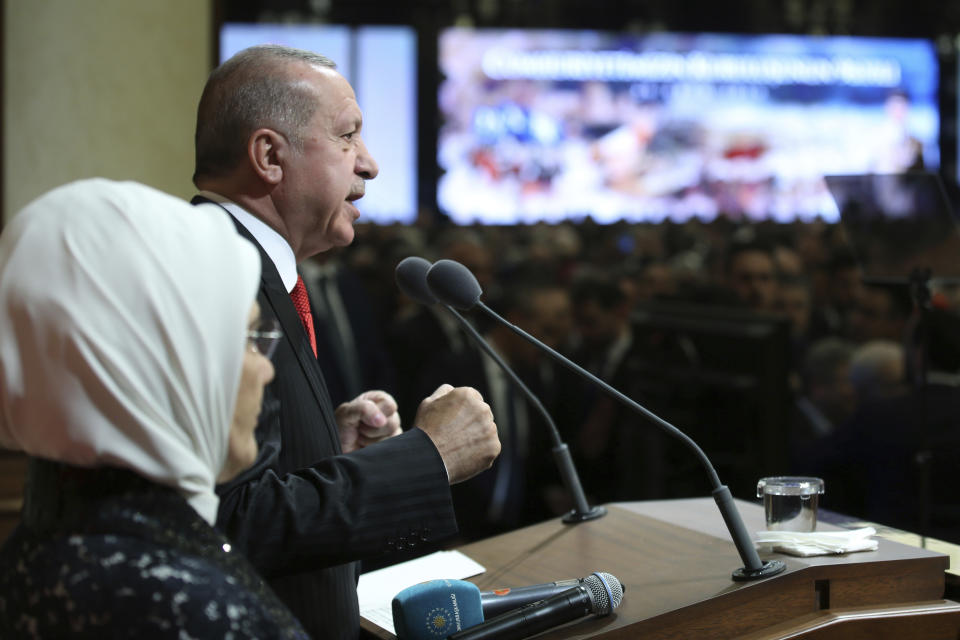Erdogan: Joint patrols with Turkey and Russia start Friday
ISTANBUL (AP) — Joint Turkish-Russian patrols will begin Friday in northeastern Syria, following a Russian-brokered cease-fire that promised to have Syrian Kurdish forces withdraw to the south, Turkey's president said Wednesday.
Recep Tayyip Erdogan told his ruling party that Turkey won't hesitate to relaunch its operation if the Kurdish fighters do not abandon the 30-kilometer (19-mile) deep area or continue their attacks against Turkish troops. He said Turkey will "respond in the harshest way to any attacks" and that "if needed, we will expand our safe zone."
Turkey invaded northeastern Syria earlier this month to push Syrian Kurdish fighters from the area. Ankara considers them terrorists linked to an insurgency in Turkey.
The cease-fire to allow the Syrian Kurdish forces to withdraw has largely held, despite occasional clashes. Russia informed Turkey of the withdrawal of some 34,000 fighters along with 3,260 heavy weapons, Erdogan said, including from Tal Rifaat and Manbij, towns west of the Euphrates River, but he added that Turkey would confirm their withdrawal through joint patrols.
Turkey and allied Syrian fighters now control a portion of the previously Kurdish-held border zone, encompassing the towns of Tal Abyad and Ras al-Ayn, as Russian and Syrian government troops move into the rest of the Kurdish-held areas following a deal with the Kurdish force.
Erdogan said Kurdish-held Kobani, also known as Ayn al-Arab, must also be "brought under our control.
Meanwhile, in Geneva, delegations from Syria's government, opposition and civil society gathered for the first time Wednesday to discuss the country's constitution, billed by a U.N. mediator as a "momentous" task that could help their country emerge from nearly nine years of war.
An "opening ceremony" for the U.N.-brokered, tripartite constitutional committee offered a symbolic step by bringing once-defiant sides into the same room for talks, but the substance and possible achievements remain unknown.
U.N. envoy for Syria Geir Pedersen called on the sides to be "patient and persistent" and warned of unknowns such as terror attacks or fighting that could derail the talks that have taken many months to organize.
The meeting has been billed as a Syrian-led process, with U.N. Secretary-General Antonio Guterres calling it an important step in "creating the conditions for a political solution." Countries including Iran, Russia, Turkey and the United States are keeping close watch.
Russian President Vladimir Putin hailed the meeting in Geneva as a major step toward political settlement.
"Within the committee's framework the government, the opposition and representatives of civil society will be able to work directly and without foreign interference on the constitutional reform, state-building and stable development of the country," Putin said on a visit to Hungary.
At a Russian-hosted Syrian peace conference in January 2018, an agreement was reached to form a 150-member committee to draft a new constitution. This was a key step toward elections and a political settlement to the Syrian conflict, which has killed over 400,000 people.
There was early agreement on 50-member lists from the Syrian government and the opposition. But it has taken nearly 20 months to agree on the list the United Nations was authorized to put together representing experts, independents, tribal leaders and women, mainly because of objections from the Syrian government.
The agreement calls for a Syrian-led political process starting with the establishment of a transitional governing body vested with full executive powers, moving on to the drafting of a new constitution and ending with elections. The Security Council unanimously endorsed the agreement in a resolution in December 2015 that set a timetable for talks and a cease-fire that was never met.
___
Keaten reported from Geneva.



